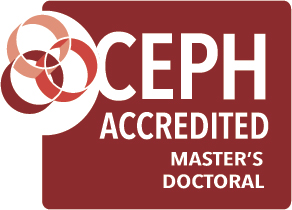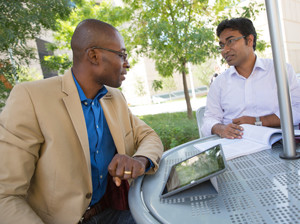Salary & Career Outlook
- ZipRecruiter reports that the average salary for MPH in Maternal and Child Health for 2023 in Texas is $77,592 with a salary growth that is three times faster than inflation.
- Talent.com reports that the average in Texas varies from $75,322 to $106,444.
- Job outlook for the next 10 years: 28% (much faster than average).
Faculty & Staff
Learn more about our faculty and staff by visiting the CPH Faculty and Staff page.
Cost, Scholarships & Financial Aid
Total program tuition and fees cost estimates are available via the Office of Student Finance.
Scholarship opportunities are available for cohort applicants. All applications complete and verified in SOPHAS or HAMPCAS by March 15 (priority deadline) will be considered with no additional application required. We suggest submitting your application by Feb. 15 to allow time for SOPHAS verification.
Financial Aid is available to support tuition, fees and living expenses. Average loans taken for HSC’s College of Public Health students are shared by the Financial Aid office.
If you have specific questions, please contact HSC’s Financial Aid Office via:
Curriculum
Learn more about HSC’s MPH in Maternal and Child Health curriculum here.
About The Program
- Cohort full-time: Students in the MPH in Maternal and Child Health program take 12 credit hours each semester.
- On-campus: The program is offered at The University of North Texas Health Science Center at Fort Worth (UNTHSC).
- Program duration: Students complete the MPH in maternal and child health program in five semesters over two years, including summer.
- Fall entrance only: New students are admitted in the fall semester. There are no spring or summer start options.
- Small class sizes: Core classes range from 20 to 35 students, while concentration classes have 10-20 students. This ensures personalized attention and better interaction with faculty.
- Cohort format: The program follows a pre-determined sequence and pace, enhancing student success and fostering strong networking opportunities. The cohort model also helps in building quality relationships with peers and faculty.
- Professional development and IPE sessions: Students participate in weekly interlude meetings for career and field preparation. These include alumni panels, networking events, coaching and guest speakers specific to women’s maternal and reproductive health. Additionally, interprofessional education (IPE) activities bring students from various university schools together for cross-disciplinary training. This collaborative work with medical professionals also provides practical, real-life experience.
Now is the time to apply in the MPH in Maternal and Child Health program and significantly make a difference in public health.
Practice Experience
Students in the MPH in maternal and child health program complete an intensive hands-on experience with local public health nonprofits, governmental institutions or health systems. This experience is designed to align with each student’s field passions and career goals, providing a tailored and impactful learning opportunity.
Key components of the practice experience:
- Placement: Students complete their practice experience with organizations that match their interests and career aspirations. This can include public health nonprofits, government health departments or health care systems.
- Duration: Students are required to complete 400 hours of practical experience over the course of three semesters. Consequently, this ensures they gain substantial hands-on exposure.
- Project work: During this period, students undertake significant projects for their host organizations. Projects include:
- Designing and implementing new educational programs.
- Supporting and analyzing extensive data sets.
- Managing policy analysis and development efforts.
- Professional development: Additionally, this experience provides valuable professional references, enhances interview discussions and builds confidence in the student’s chosen career path.
Through this professional field experience, students gain practical skills, develop a network of professional contacts and enhance their resume with real-world public health projects. This comprehensive approach ensures that graduates are well-prepared for successful careers in epidemiology.
Now is the time to apply in the MPH in Maternal and Child Health program and significantly make a difference in public health.
Program Overview
An MPH degree specializing in maternal and child health is a focused public health program designed to equip students with the knowledge and skills necessary in order to address health issues specific to women, children and families. This specialization prepares graduates to become leaders in the field, working towards improving the health outcomes of these populations through research, policy and community health initiatives.
Key components of the MPH in maternal and child health
- Interdisciplinary curriculum:
- Courses cover a broad range of topics, including maternal and child health, reproductive health, biostatistics, epidemiology and health policy.
- Students gain a comprehensive understanding of the social, biological and environmental factors affecting women’s and reproductive health.
- Focus areas:
- Maternal and child health: Emphasis on health issues affecting mothers and children, including prenatal and postnatal care.
- Reproductive health: Topics include family planning, sexual health and also reproductive rights.
- Health disparities: Addressing inequalities in health outcomes among different populations.
- Hands-on experience:
- Students complete a significant number of practice hours in public health settings, such as nonprofits, governmental institutions and health care systems.
- This practical experience is critical for developing real-world skills and building professional networks.
- Professional development:
- The program includes professional development sessions, which may feature alumni panels, networking events and guest speakers.
- Interprofessional education (IPE) activities bring students from various disciplines together for collaborative training.
- Research opportunities:
- Students engage in research projects that explore critical issues in women’s maternal and reproductive health.
- These projects often involve collaboration with faculty and community organizations.
What are the career outcomes with an MPH in maternal and child health?
Graduates with an MPH in maternal and child health are well-prepared for various roles in public health. Some potential career paths include:
- Public health educator:
- Design and implement health education programs for women and families.
- Focus on topics like nutrition, prenatal care and family planning.
- Health policy analyst:
- Analyze and develop policies aimed at improving women’s health services.
- Work with government agencies, nonprofits or advocacy groups.
- Epidemiologist:
- Study patterns and causes of health issues in women and children.
- Conduct research and data analysis to inform public health interventions.
- Program manager:
- Oversee public health programs targeting women’s health.
- Ensure effective implementation and evaluation of these programs.
Why choose the MACH specialization?
- Address critical health Issues: Focus on improving the health outcomes of women and children, a vital area of public health.
- Diverse career opportunities: Prepare for various roles in public health, from education and policy to research and program management.
- Make a difference: Contribute to reducing health disparities and promoting health equity among vulnerable populations.
Therefore, an MPH degree specializing in maternal and child health is an excellent choice for those passionate about making a significant impact in public health. Apply today in order to start your journey towards a rewarding career in maternal and child health.
Now is the time to apply in the MPH in maternal and child health program and significantly make a difference in public health.
The MPH maternal and child health concentration stands out from other MPH programs due to its specific focus on the health issues and needs of women, children and families. This specialization offers unique courses, practical experiences and professional development opportunities tailored to this critical area of public health.
Unique aspects of the MPH maternal and child health concentration
- Focused curriculum:
- Specialized courses: The curriculum includes courses specifically designed to address women’s and reproductive health, such as Maternal and Child Health, Human Sexuality and Reproductive Health, and Maternal and Child Health Epidemiology.
- Interdisciplinary approach: The program integrates knowledge from various disciplines, including medicine, biology, sociology, psychology and public health.
- Practical experience:
- Hands-on training: Students complete a 400-hour practice experience with organizations that align with their career goals. This hands-on training is especially critical in order to gain practical skills and real-world experience.
- Field placements: Opportunities to work with public health nonprofits, governmental institutions and health care systems, designed to emphasize on women’s maternal and reproductive health issues.
- Professional development:
- Career preparation: The program includes professional development sessions, such as alumni panels, networking events and guest speakers, to prepare students for leadership roles in the field.
- Interprofessional Education (IPE): Collaborative activities with students from various health disciplines enhance teamwork and communication skills.
- Research opportunities:
- Targeted research projects: Students engage in research projects that address critical issues in women’s maternal and reproductive health, often in collaboration with faculty and community organizations.
- Policy analysis: Opportunities to analyze and develop health policies aimed at improving women’s health services.
How does MACH compare with other MPH programs?
- General public health programs:
- Broad focus: General MPH programs cover a wide range of public health topics, providing a comprehensive overview but not specializing in any particular area.
- Diverse curriculum: While these programs offer diverse coursework, they may lack the depth of focus on women’s and reproductive health provided by a specialized concentration.
- Other specializations:
- Epidemiology: Focuses on the study of disease patterns and causes in populations, with less emphasis on specific health issues of women and children.
- Global health: Addresses health issues on a global scale, often focusing on infectious diseases, health systems and international health policies.
- Health policy and management: Concentrates on the development and implementation of health policies and the management of health services, with less focus on direct health issues of specific populations.
What are the benefits of choosing the maternal and child health concentration?
- Expert knowledge: Gain specialized knowledge and skills that are directly applicable to improving the health of women, children and families.
- Targeted career paths: Prepare for specific roles in public health, such as program manager, health policy analyst and public health educator, with a focus on women’s maternal and reproductive health.
- Impactful work: Contribute to addressing critical health disparities and promoting health equity among vulnerable populations.
Therefore, the MPH maternal and child health concentration offers a unique and comprehensive approach to public health education, distinct from other MPH programs. Apply today in order to specialize in this vital area and make a significant impact on public health.
Now is the time to apply in the MPH in maternal and child health program and significantly make a difference in public health.
The MPH maternal and child health program is designed to equip students with the knowledge, skills and competencies necessary to address the unique health challenges faced by women, children and families. Graduates of this program will be well-prepared to lead public health initiatives, conduct impactful research and advocate for policies that promote women’s and reproductive health.
Key learning outcomes to the MPH MACH program
- Comprehensive knowledge of maternal and child health:
- Understand the major determinants of maternal and child health, including biological, social and environmental factors.
- Gain insights into the unique health needs and challenges faced by women and children across the life course.
- Program planning and evaluation:
- Develop skills in designing, implementing and evaluating public health programs that aim to improve women’s maternal and reproductive health.
- Utilize evidence-based practices to assess program effectiveness and impact.
- Research and analytical skills:
- Acquire proficiency in epidemiological methods and biostatistics in order to conduct rigorous public health research.
- Analyze and interpret health data to inform public health interventions and policies.
- Policy analysis and advocacy:
- Learn to analyze health policies and their impact on women’s reproductive health.
- Develop advocacy skills to promote policies that support health equity and access to care for women and children.
- Interprofessional collaboration:
- Participate in interprofessional education (IPE) activities in order to enhance teamwork and communication skills.
- Collaborate effectively with health care professionals from various disciplines in real-world public health settings.
- Cultural competence:
- Understand and address health disparities affecting diverse populations.
- Develop culturally competent strategies to improve health outcomes for women and children from different backgrounds.
Practical and professional skills to the MPH MACH program
- Hands-on experience:
- Complete a 400-hour practice experience in a public health setting. As a result, you will gain practical skills and building professional networks.
- Work on significant projects, such as designing educational programs, supporting data analysis, and managing policy development efforts.
- Leadership and management:
- Develop leadership and management skills to lead public health initiatives and programs.
- Learn to navigate complex organizational and community dynamics to achieve public health goals.
- Communication and outreach:
- Enhance communication skills to effectively convey public health messages to diverse audiences.
- Engage in community outreach and education to promote health awareness and preventive practices.
- Career preparation:
- Participate in professional development sessions, including alumni panels, networking events, and guest speakers.
- Prepare for various career paths in public health, such as public health educator, health policy analyst, epidemiologist and program manager.
- Research and publication:
- Engage in research projects that address critical issues in women’s maternal and reproductive health.
- Contribute to the field through research publications and presentations at conferences.
Therefore, the learning outcomes of the MPH maternal and child health program ensure that graduates are equipped to make a meaningful impact in public health. Apply today in order to advance your career and become a leader in women’s maternal and reproductive health.
Now is the time to apply in the MPH in maternal and child health program and significantly make a difference in public health.
The MPH maternal and child health program at HSC takes a comprehensive approach to global health issues, therefore preparing students to tackle these challenges through education, research and practical experience.
- Global health curriculum:
- International perspectives: Courses include global health topics, examining health disparities, maternal and child health issues and reproductive health in different cultural contexts. Students may also learn about international health systems, policies and practices.
- Cultural competence: Training emphasizes cultural competence, therefore enabling students to work effectively in diverse global settings. Courses cover strategies for addressing health disparities and promoting health equity worldwide.
- Research and fieldwork:
- Global research projects: Students can engage in research projects focused on global health issues, such as infectious diseases, maternal mortality and reproductive health. Collaboration with international organizations and academic institutions enhances research opportunities.
- Field placements: Opportunities for field placements in international health settings provide hands-on experience. Students can also work with NGOs, governmental agencies and health care organizations abroad, addressing real-world health challenges.
- Interprofessional education (IPE):
- Collaborative learning: Interprofessional education activities involve collaboration with students and professionals from various health disciplines. These activities also prepare students for team-based approaches to global health issues.
- Policy and advocacy:
- Health policy analysis: Students analyze and develop policies aimed at improving global women’s maternal and reproductive health. Training also includes advocacy skills to influence health policy at international levels.
Therefore, by addressing global health issues through a diverse curriculum, hands-on research and fieldwork, the MPH maternal and child health program equips students to make a global impact. Apply today in order to become a leader in global health.
Now is the time to apply in the MPH in Maternal and Child Health program and significantly make a difference in public health.
The MPH maternal and child health program at HSC places a strong emphasis on cultural competence, in order to ensure that graduates are well-prepared to work effectively with diverse populations. Here’s how the program integrates cultural competence into its curriculum and training:
Curriculum integration
- Courses on cultural competence:
- Specialized courses focus on cultural competence in health care in order to teach students to understand and respect cultural differences in health beliefs and practices.
- Topics can also include health disparities, social determinants of health and culturally responsive care.
- Global health perspectives:
- Courses incorporate global health perspectives, examining how cultural contexts especially influence women’s and reproductive health worldwide.
- Students study international health systems and practices in order to gain a broader understanding of global health issues.
Practical training
- Community engagement:
- Students participate in community-based projects that involve working with diverse populations.
- These projects help students apply cultural competence principles in real-world settings, therefore improving health outcomes through culturally tailored interventions.
- Field placements:
- Field placements provide opportunities to work in multicultural environments, both locally and internationally.
- Students gain hands-on experience addressing health needs in various cultural contexts.
Interprofessional education (IPE)
- Collaborative learning:
- IPE activities involve collaboration with students from different health disciplines in order to foster a multidisciplinary approach to health care.
- This collaboration also enhances students’ ability to work in diverse teams and understand different cultural perspectives.
Now is the time to apply to our maternal and child health master’s program
Faculty expertise
- Diverse faculty:
- The program boasts a diverse faculty with expertise in cultural competence and also making a huge impact on global health.
- Faculty members bring a wealth of knowledge and experience from different cultural backgrounds and health systems.
- Mentorship and guidance:
- Faculty provide mentorship and guidance in order to help students navigate cultural challenges in their professional practice.
- Mentors support students in developing culturally sensitive approaches to maternal and child health care.
Research and policy
- Culturally informed research:
- Students engage in research projects that explore cultural factors affecting women’s maternal and reproductive health. Additionally, these projects provide insights into diverse health practices.
- Research findings are used to develop culturally informed health interventions and policies. Consequently, these interventions are more effective in diverse populations.
- Advocacy and policy development:
- Our training also includes advocacy skills to promote policies that address health disparities and support culturally competent care.
- Students therefore learn to influence health policy at local, national and international levels.
Incorporating cultural competence into the MPH maternal and child health program ensures that graduates can provide effective, respectful and equitable care to diverse populations. Apply today in order to gain the skills needed to make a meaningful impact in women’s and reproductive health across various cultural contexts.
Now is the time to apply in the MPH in Maternal and Child Health program and significantly make a difference in public health.
The MPH maternal and child health program at UNTHSC stands out for its comprehensive approach, combining rigorous academics, practical experience and an especially strong emphasis on cultural competence. Here are some of the unique features that can also set this program apart:
- Specialized curriculum:
- Focused courses: The curriculum includes courses specifically designed to address the unique health needs of women, children and families. Topics also cover maternal and child health, reproductive health, health disparities and policy analysis.
- Interdisciplinary approach: Integrates knowledge from various fields such as medicine, sociology, psychology and public health to provide a holistic view of women’s health issues.
- Hands-on experience:
- Practice experience: Students complete a 400-hour hands-on practice experience in public health settings. This may also include working with nonprofits, governmental institutions and health care systems to apply their knowledge in real-world scenarios.
- Field placements: Opportunities for field placements both locally and internationally. Students gain practical experience in diverse cultural and health care environments.
- Cultural competence:
- Cultural competence training: Emphasis on understanding and respecting cultural differences in health beliefs and practices. Specifically, courses and projects focus on addressing health disparities and promoting health equity.
- Global health perspectives: The curriculum incorporates global health issues, therefore preparing students to work effectively in various cultural contexts.
- Research opportunities:
- Collaborative research projects: Engage in faculty-led and independent research projects focused on women’s maternal and reproductive health. Additionally, you may have opportunities to publish research findings and present at conferences.
- Community-based research: Conduct research in partnership with local organizations in order to address community health needs. It is important to realize that these projects often focus on designing and evaluating health interventions for women and children.
Apply today in the maternal and child health specialty program
- Professional development:
- Interprofessional education (IPE): Collaborative learning activities with students from other health disciplines prepare students for team-based approaches to health care and public health challenges.
- Career preparation: Weekly professional development sessions, including networking events, alumni panels and guest speakers. Emphasis on leadership and management skills for public health professionals.
- Supportive learning environment:
- Small class sizes: This ensures personalized attention and better interaction with faculty. Core classes range from 20 to 35 students, while concentration classes have 10-20 students.
- Cohort model: Students progress through the program together in a cohort, therefore fostering strong networking opportunities and peer support. As a result, the Cohort format enhances student success and completion rates.
- Financial support:
- Scholarships and assistantships: Competitive scholarships and assistantship opportunities are available for eligible students. This also includes GA, RA and TA positions that provide financial support and work experience.
In conclusion, the unique features of the maternal and child health program at UNTHSC provide a robust education and practical experience to prepare you for a successful career in public health. Apply today in order to take advantage of these exceptional opportunities and make a significant impact in the field of women’s and reproductive health.
Now is the time to apply in the MPH in Maternal and Child Health program and significantly make a difference in public health.
Admissions and Application
The MPH maternal and child health program seeks dedicated and passionate individuals ready to make a difference in public health. Below are the detailed admission requirements for this program:
- Educational background:
- Bachelor’s degree: Applicants must hold a bachelor’s degree from an accredited institution. A background in health sciences, social sciences or a related field is preferred but not required.
- Academic performance:
- GPA requirement: While there is no minimum GPA requirement, admission is competitive. Strong academic performance, typically reflected by a GPA of 3.0 or higher is advantageous.
- Standardized tests:
- GRE scores: GRE scores are not required for the MPH maternal and child health program. However, applicants may submit GRE, MCAT, DAT, PCAT, LSAT or GMAT scores to strengthen their application if desired.
- Prerequisites:
- Coursework: No specific prerequisite courses are required. Relevant coursework in biology, social sciences, statistics or public health is beneficial.
- Professional experience:
- Work experience: Work experience in a related field is not mandatory. but it is considered a plus. Relevant internships, volunteer work or professional experience in public health, women’s health or community health can enhance an application.
- Application materials:
- Transcripts: Official transcripts from all post-secondary institutions attended must be submitted.
- Letters of recommendation: Two to three letters of recommendation are required. Recommenders should be individuals who can also speak to the applicant’s academic abilities, professional experience and potential for success in the program.
- Personal statement: A well-written personal statement outlining the applicant’s interest in women’s and reproductive health, career goals and reasons for choosing the program. The statement should also highlight relevant experiences and how the program aligns with the applicant’s professional aspirations.
- Resume or CV: A current resume or CV detailing educational background, work experience, volunteer activities and any relevant skills or certifications.
Make a lasting impact in maternal and child health
- Additional requirements for international students:
- English language proficiency: International applicants must demonstrate proficiency in English. Accepted tests include TOEFL (minimum score: 85 iBT), IELTS (minimum score: 6.5) or equivalent. Once completed, your scores must be sent directly to the application system using the appropriate codes (SOPHAS code: #5688).
- Credential evaluation: International transcripts must be evaluated by a recognized credential evaluation service such as WES (World Education Services).
- Application process:
- Application submission: Applications must be submitted through SOPHAS (Schools of Public Health Application Service). Ensure all required documents are uploaded and the application is complete by the deadline.
- Application deadlines: The program typically accepts new students for the fall semester. Priority application deadline is March 15. Submitting by Feb. 15 is also highly recommended to allow time for SOPHAS verification.
- Financial aid and scholarships:
- Scholarships: Competitive scholarships are available for qualified applicants. No separate application is required for these awards.
- Financial aid: Various financial aid options, including grants, loans and work-study opportunities, are available. Applicants are encouraged to contact the financial aid office for detailed information and assistance.
Therefore, meeting these admission requirements will help ensure your application is competitive. Apply now in order to take the next step toward a rewarding career in maternal and child health care.
Now is the time to apply in the MPH in maternal and child health program and significantly make a difference in public health.
The MPH maternal and child health program follows a structured admissions timeline in order to ensure all applicants have ample time to prepare and submit their materials. Here are the key deadlines and important dates for the application process:
- Key application deadlines:
- Priority application deadline — March 15: Submitting your application by this date increases your chances of receiving scholarships and financial aid. It also ensures early consideration for admission.
- Recommended submission date — Feb. 15: To allow sufficient time for the SOPHAS verification process, it is advisable to submit your application by this date.
- Final application deadline — July 1: This is the last date to submit your application for the upcoming fall semester. All application materials must be complete and verified by SOPHAS by this deadline.
- Important considerations:
- SOPHAS verification: The verification process can take several weeks. Submitting your application well before the deadline helps avoid delays and ensures your application is reviewed on time.
- Document submission: Make sure all required documents, including transcripts, letters of recommendation, personal statement and resume/CV, are submitted and received by SOPHAS before the final deadline.
- International applicants: International students should consider additional time for credential evaluation and English language proficiency test scores. Plan to submit these documents early to avoid any issues with the application timeline.
Application tips for the MPH in maternal and child health program
- Application tips:
- Early preparation: Start preparing your application materials early, including writing your personal statement and gathering letters of recommendation.
- Stay informed: Regularly check the status of your application in SOPHAS to ensure all components are complete and submitted.
- Reach out for help: If you have any questions or need assistance with the application process, contact the admissions office at HSC in order to get the support that you need.
Therefore, mark these key dates on your calendar and start preparing your application now. Apply today in order to secure your spot in the MPH Maternal and Child Health program and take the first step toward a rewarding career in public health.
Now is the time to apply in the MPH in maternal and child health program and significantly make a difference in public health.
Applying for the MPH maternal and child health program involves submitting a set of essential documents that provide a comprehensive view of your academic background, professional experience and motivation for pursuing this degree. Here is a detailed list of the required documents:
- Required documents:
- Official transcripts: Submit official transcripts from all post-secondary institutions attended. Moreover, ensure transcripts reflect all completed coursework, grades and any awarded degrees.
- Letters of recommendation: Provide two to three letters of recommendation. Additionally, recommenders should be individuals who can attest to your academic abilities, professional experience and potential for success in the program. Common recommenders may also include professors, employers or professional mentors.
- Personal statement: Write a well-crafted personal statement (typically 500-750 words) outlining your interest in women’s maternal and reproductive health. Furthermore, discuss your career goals, relevant experiences and why you are choosing this particular MPH program. It is important to also highlight how the program aligns with your professional aspirations and how you plan to contribute to the field.
- Resume or CV: Submit a current resume or curriculum vitae (CV) detailing your educational background, work experience, volunteer activities and also any relevant skills or certifications. In addition, please include any public health-related experiences, internships or research projects.
- Additional documents for international applicants:
- English language proficiency scores:
- Credential evaluation: International transcripts must be evaluated by a recognized credential evaluation service such as WES (World Education Services). This also ensures that your academic qualifications meet the program’s standards.
Optional documents that can help strengthen your MPH application process
- Optional documents:
- Standardized test scores: While GRE scores are not required, applicants may choose to submit GRE, MCAT, DAT, PCAT, LSAT or GMAT scores to enhance their application. These scores can provide additional evidence of your academic capabilities.
- Submission process:
- Application system: All documents must be submitted through the SOPHAS (Schools of Public Health Application Service) online system. Ensure all documents are uploaded and the application is complete before the submission deadline.
- Deadlines: Priority application deadline: March 15. Recommended submission date: Feb. 15 (in order to allow time for SOPHAS verification). The final application deadline: July 1.
- Important tips:
- Early preparation: Begin gathering and preparing your documents well in advance of the application deadlines. Reach out to recommenders early to ensure they have ample time to write and submit their letters.
- Accuracy and completeness: Double-check all documents for accuracy and completeness before submission. Incomplete applications may delay the review process or impact your chances of admission.
- Follow-up: Regularly check the status of your application in the SOPHAS system to ensure all documents have been received and verified.
In conclusion, gather all required documents and start your application today in order to secure your place in the MPH maternal and child health program. This program is your gateway to making a significant impact in public health.
Now is the time to apply in the MPH in Maternal and Child Health program and significantly make a difference in public health.
Absolutely! The MPH maternal and child health program welcomes applicants from diverse educational backgrounds, including fields like medicine, biology, nursing, nutrition, women’s studies, anthropology, social work, sociology and psychology.
- The program provides foundational courses in public health in order to ensure all students gain the necessary knowledge and skills.
- Professional experience in health-related fields, community service or any role involving health and wellness can also strengthen your application.
- Highlight your relevant experiences and transferable skills in your personal statement to showcase your potential. Apply today in order to make a significant impact in public health.
Now is the time to apply in the MPH in Maternal and Child Health program and significantly make a difference in public health.
Yes, international students can and also are encouraged to apply for financial aid in the MPH maternal and child health program. While options may differ from those for domestic students, several avenues are available for financial support.
Financial aid options for international students
- University scholarships:
- Eligibility: Includes merit-based scholarships e.g. Dean’s Award, President’s Award and Chancellor’s Award.
- Application process: No separate application required; all applicants who meet the priority deadline are also considered.
- Graduate assistantships (GA), research assistantships (RA) and teaching assistantships (TA):
- Opportunities: These positions provide financial support and work experience.
- Work hours: Up to 19 hours per week.
- Application: You can apply separately after admission.
- International student loans:
- Availability: Some lenders offer loans for international students. However, these loans often require a U.S. co-signer.
- Resources: Contact the financial aid office for a list of recommended lenders.
- Health insurance and additional costs:
- Student insurance is a requirement:
- Automatically billed for international students.
- Cost: Approximately $997 per semester or $2,600 per year.
- Student insurance is a requirement:
- TOEFL or IELTS scores:
Therefore, international students have several financial aid options available. Apply today in order to start your journey in the MPH maternal and child health program.
Now is the time to apply in the MPH in Maternal and Child Health program and significantly make a difference in public health.
Curriculum and Learning Experience
The MPH in maternal and child health curriculum is designed to provide students with a comprehensive understanding of the various factors affecting the health of women, children and families. This interdisciplinary program includes core public health courses as well as specialized courses focused on women’s and reproductive health.
Core courses of the MPH in maternal and child health specialty:
- Introduction to Maternal and Child Health:
- An overview of the key issues, trends and policies affecting maternal and child health.
- Focus on health disparities, determinants of health and program planning.
- Principles of Biostatistics:
- Fundamental concepts and methods in biostatistics.
- Application of statistical techniques to public health data.
- Principles of Epidemiology:
- Basic principles and methods of epidemiology.
- Study design, data analysis and interpretation of epidemiological research.
- Theoretical Foundations of Individual and Community Health:
- Examination of theories and models of health behavior.
- Application of these theories to public health practice.
Specialized courses of the MACH specialty:
- Maternal and Child Health Across the Life Course:
- Exploration of health issues affecting women and children at different stages of life.
- Emphasis on life course theory and its application to public health.
- Human Sexuality and Reproductive Health:
- Study of human sexuality, reproductive health and sexual health education.
- Focus on sexual health promotion and disease prevention.
- Maternal and Child Health Epidemiology:
- Advanced epidemiological methods specific to maternal and child health.
- Analysis of health data to inform public health interventions.
- Community Assessment and Program Planning:
- Techniques for assessing community health needs and planning effective health programs.
- Emphasis on participatory approaches and community engagement.
- Applied Public Health Methods:
- Practical application of public health research methods.
- Focus on data collection, analysis and reporting.
- Community Health Program Evaluation:
- Methods and techniques for evaluating public health programs.
- Application of evaluation results to improve program effectiveness.
- Participatory Approaches to Improving Community Health:
- Strategies for involving community members in public health initiatives.
- Emphasis on collaborative problem-solving and empowerment.
Practice experience of the MACH specialty:
- MPH practice experience:
- A 600-hour hands-on practice experience in a public health setting.
- Projects may include designing and implementing health programs, supporting data analysis and managing policy development efforts.
- Comprehensive examination:
- CPH comprehensive examination: An exam covering core public health competencies.
- Assesses students’ understanding and application of their public health education.
MACH elective courses and professional development
- Elective courses:
- Students choose electives that align with their career goals and interests.
- Requires advisor approval to ensure relevance to the program.
- Professional development sessions:
- Weekly sessions focusing on career preparation and field-specific topics.
- Includes alumni panels, networking events and guest speakers.
This comprehensive curriculum ensures that graduates of the MPH in maternal and child health program are well-prepared to address the unique health challenges faced by women, children and families. Apply today in order to gain the specialized knowledge and skills needed to make a difference in public health.
Now is the time to apply in the MPH in maternal and child health program and significantly make a difference in public health.
Yes, students can engage in various research projects during the MPH Maternal and Child Health program, enhancing their understanding and skills.
- Research opportunities:
- Faculty-led research: Collaborate with experienced faculty on projects in areas like maternal health and reproductive health. Moreover, these collaborations will enhance your research skills and knowledge.
- Independent research: Conduct original research through thesis or capstone projects under faculty supervision.
- Community-based research: Partner with local public health organizations in order to address community health needs.
- What are the benefits?
- Skill development: Improve analytical and critical thinking skills.
- Professional growth: Network with professionals in order to gain research experience.
- Career preparation: Enhance your resume with hands-on research projects.
Participating in research projects can significantly boost your educational experience.
Now is the time to apply in the MPH in Maternal and Child Health program and significantly make a difference in public health.
Graduates of the MPH maternal and child health program are equipped with the skills and knowledge in order to take on a variety of impactful projects. These projects address key issues in women’s maternal and reproductive health, often involving collaboration with community organizations, health care systems and governmental institutions.
- Key project areas:
- Designing and implementing educational programs:
- Focus: Create health education initiatives aimed at improving women’s and reproductive health awareness.
- Prenatal care workshops, family planning seminars and sexual health education campaigns.
- Focus: Create health education initiatives aimed at improving women’s and reproductive health awareness.
- Supporting and analyzing data sets:
- Focus: Collect, analyze and interpret health data to inform public health strategies.
- Research on maternal mortality rates, studies on reproductive health disparities and analysis of health service utilization.
- Focus: Collect, analyze and interpret health data to inform public health strategies.
- Managing policy analysis and development:
- Focus: Evaluate and develop policies to enhance women’s health services and access to care.
- Advocating for maternal health legislation, developing guidelines for reproductive health services and policy briefs on women’s health issues.
- Focus: Evaluate and develop policies to enhance women’s health services and access to care.
- Designing and implementing educational programs:
Specific project examples of our MPH in maternal and child health students
- Specific project examples
- Community health assessments:
- Conduct comprehensive assessments to identify the health needs of women and children in specific communities.
- You will develop action plans based on assessment findings in order to address identified health gaps.
- Program evaluation:
- Evaluate the effectiveness of existing women’s health programs in order to improve service delivery and outcomes.
- You will provide recommendations for program enhancements based on evaluation results.
- Health promotion campaigns:
- Design and implement campaigns to promote healthy behaviors among women and families.
- You may also use multimedia platforms and community outreach to disseminate health information.
- Research projects:
- Engage in research on critical women’s health issues, such as cervical cancer prevention, maternal mental health and adolescent reproductive health.
- Collaborate with academic institutions and health organizations to conduct and publish research findings.
- Interprofessional collaborations:
- Work with professionals from various health disciplines to develop comprehensive health interventions.
- Participate in interprofessional education (IPE) activities to enhance collaborative skills.
- Community health assessments:
What are the benefits of project work?
- Practical experience:
- Gain especially valuable hands-on experience in real-world public health settings, applying theoretical knowledge to practical challenges.
- Develop skills in project management, data analysis and health communication.
- Professional development:
- Build a network of professional contacts through collaborative projects and community partnerships.
- You will enhance your resume with diverse project experiences, making you a competitive candidate for public health positions.
- Impactful contributions:
- Make meaningful contributions to improving women’s maternal and reproductive health at the community, state, national and international levels.
- You will address health disparities and therefore promote health equity through targeted interventions and advocacy.
Engage in impactful projects that make a real difference in women’s maternal and reproductive health. Apply today in order to gain the expertise and experience needed to lead innovative public health initiatives.
Now is the time to apply in the MPH in Maternal and Child Health program and significantly make a difference in public health.
Career and Financial Support
An MPH in maternal and child health opens the door to a variety of fulfilling career paths dedicated to improving the health of women, children and families. Graduates are also well-prepared to take on roles in diverse public health settings, from local community organizations to international health agencies.
High-demand roles in the MPH in maternal and child health program
- Public health educator:
- Role: Design and implement educational programs focused on women’s maternal and reproductive health.
- Demand: High, due to the growing need for community health education.
- Average salary: Approximately $60,000 to $70,000 per year.
- Employment sectors: Nonprofits, community health organizations and government agencies.
- Health policy analyst:
- Role: Analyze and develop policies to improve women’s health services.
- Demand: Increasing, as health policies continue to evolve.
- Average salary: Around $75,000 to $102,000 per year.
- Employment sectors: Government agencies, think tanks and advocacy groups.
- Epidemiologist:
- Role: Study disease patterns and health issues affecting women and children.
- Demand: High, particularly in research and public health surveillance.
- Average salary: Approximately $62,320 to 100,940 per year.
- Employment sectors: Research institutions, public health departments and universities.
- Program manager:
- Role: Oversee public health programs targeting maternal and child health care issues.
- Demand: Strong, as effective program management is crucial for health initiatives.
- Average salary: Between $90,000 and $116,000 per year.
- Employment sectors: Nonprofits, health care organizations and international health agencies.
- Infection prevention specialist:
- Role: Develop and implement strategies to prevent infections, focusing on maternal and child health.
- Demand: Growing, especially in health care settings.
- Average salary: Typically ranges from $75,000 to $95,000 per year.
- Employment sectors: Hospitals, public health organizations and governmental health agencies.
Other potential career paths with an MPH MACH degree
- Researcher:
- Conduct studies on women’s maternal and reproductive health in order to inform public health interventions.
- Consequently, these studies play a crucial role in shaping effective health policies and programs.
- Employment sectors include universities, research institutions and nonprofits.
- Community health worker:
- Provide health education and support to women and families in the community.
- Additionally, community health workers help bridge the gap between health care providers and the community.
- Employment sectors include local health departments, community organizations and health care providers.
- Consultant:
- Offer expertise in women’s health issues to various organizations and projects.
- Furthermore, consultants develop strategies and solutions tailored to specific health challenges.
- Employment sectors may also include consulting firms, nonprofits and international agencies.
Job outlook
-
- Employment growth: Employment of MPH specializations is projected to grow 27 percent from 2022 to 2032, much faster than the average for all occupations.
- Impact and demand: Many openings are expected to result from the need to replace workers who transfer to different occupations or exit the labor force, such as to retire.
With an MPH in maternal and child health, you can pursue diverse and impactful career paths dedicated to improving public health. Apply today in order to start your journey towards making a significant difference in the lives of women and families.
Now is the time to apply in the MPH in Maternal and Child Health program and significantly make a difference in public health.
Understanding the tuition cost for the MPH maternal and child health program is especially crucial for prospective students planning their finances. Below is a detailed overview of the tuition and fees associated with this program at The University of North Texas Health Science Center at Fort Worth.
Tuition and Fees Overview: The total program tuition and fees are available through the Office of Student Finance.
Now is the time to apply in the MPH in Maternal and Child Health program and significantly make a difference in public health.
Yes, there are several scholarship opportunities available for students enrolling in the MPH maternal and child health program. These scholarships are designed to support students financially and to also recognize their academic achievements and potential in the field of public health.
Key scholarship opportunities
- Dean’s Award:
- Description: This award recognizes outstanding academic achievements and leadership potential.
- Amount: Typically, $2,000 or more, awarded over the two-year program.
- Eligibility: All applicants who complete their application by the priority deadline are automatically considered.
- President’s Award:
- Description: This scholarship is awarded to students who demonstrate exceptional academic performance and commitment to public health.
- Amount: Varies, often in the range of several thousand dollars.
- Eligibility: No separate application is additionally required; all eligible applicants are considered based on their SOPHAS application.
- Chancellor’s Award:
- Description: This prestigious award is given to top-tier applicants who exhibit exemplary academic records and potential for leadership in maternal and child health care.
- Amount: $2,000 or more, which may qualify non-resident students for in-state tuition.
- Eligibility: This award is also automatically considered for applicants meeting the priority deadline.
Application process and deadlines
- Priority deadline:
- No separate application required:
- Scholarships are awarded based on the information provided in the SOPHAS application.
- Ensure that all sections of the application, especially your personal statements and letters of recommendation, highlight your academic achievements and commitment to public health.
Financial aid options are available for the MPH MACH program
- Graduate assistantships (GA), research assistantships (RA) and teaching assistantships (TA):
- These positions provide especially valuable experience and financial support.
- Once you are admitted, students may apply for these positions, and they typically involve up to 19 hours of work per week.
- Financial aid:
- Various financial aid options are available, including federal and state grants, loans and work-study opportunities.
- Students are also encouraged to contact the Financial Aid office for detailed information and assistance.
- Contact information for the Financial Aid Office:
- Phone: (817) 735-2505
- Email: finaid@unthsc.edu
- Webpage: HSC Financial Aid
Important tips
- Highlight achievements: In your application, emphasize your academic successes, leadership roles and your commitment to women’s maternal and reproductive health.
- Meet deadlines: Ensure all application materials are submitted and verified by the priority deadline in order to be considered for scholarships.
Therefore, take advantage of these scholarship opportunities and apply today in order to reduce your educational costs and invest in your future. Secure your place in the MPH maternal and child health program in order to start your journey towards a rewarding career in public health.
Now is the time to apply in the MPH in Maternal and Child Health program and significantly make a difference in public health.






















Social media